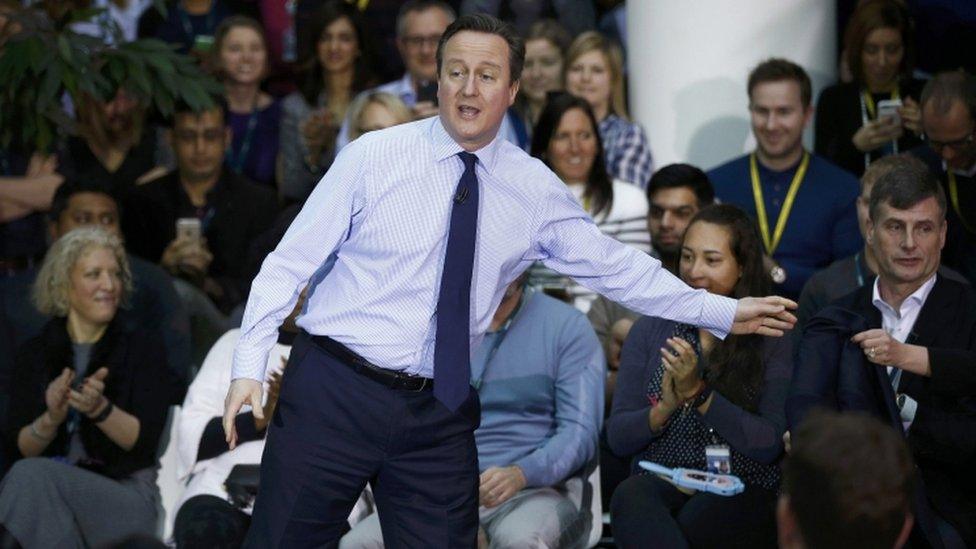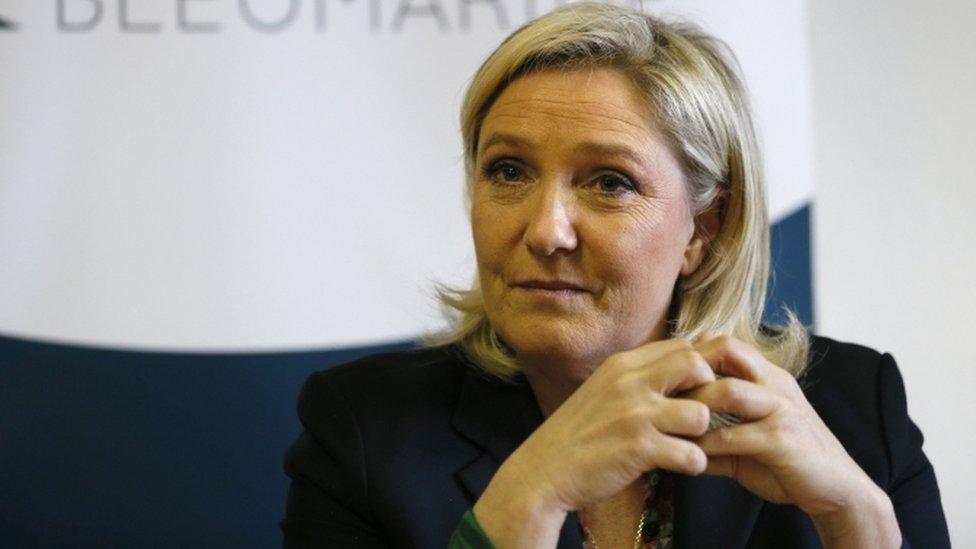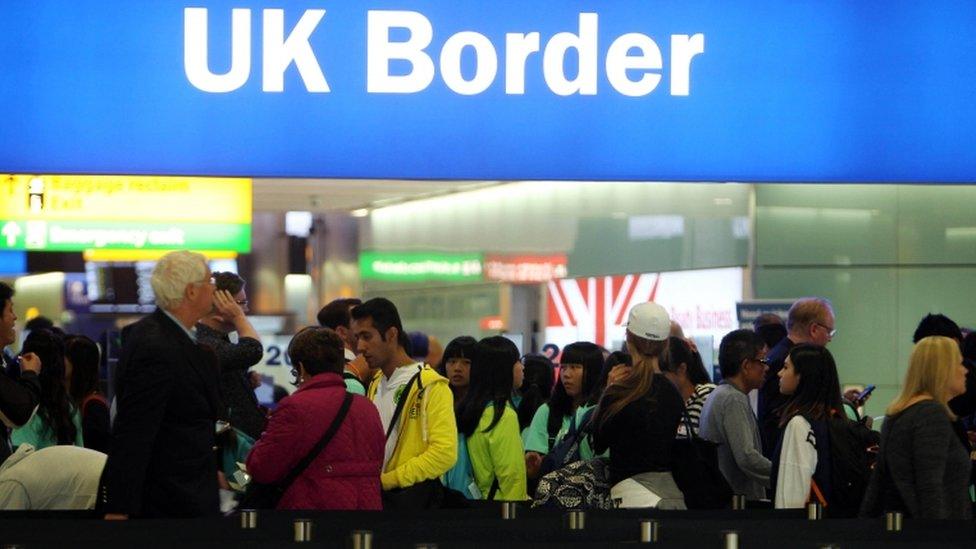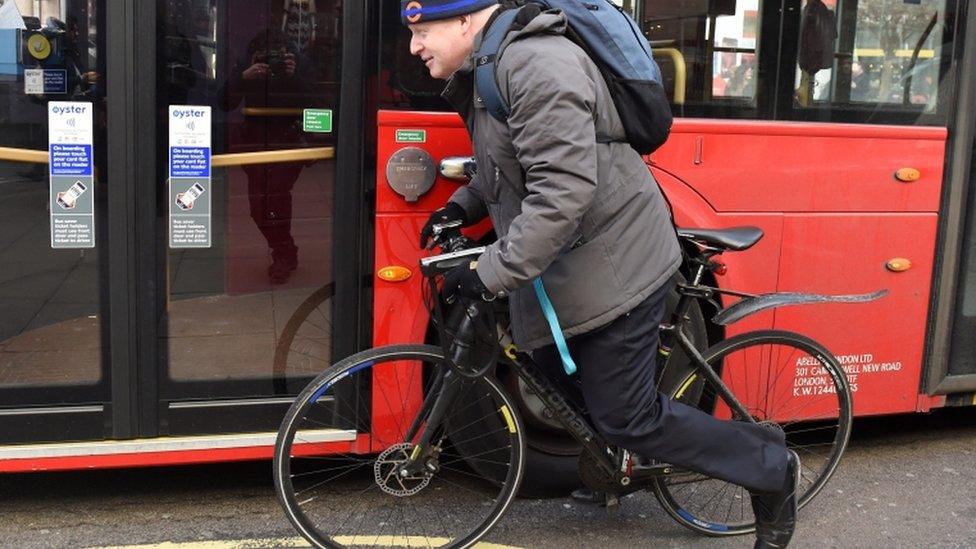Nobody knows what the EU will become
- Published

David Cameron has warned that leaving the EU would plunge the UK into deep uncertainty
Earnest, passionate, and slightly shiny - the prime minister is in his element. The messy diplomacy behind him, he is selling a simple message.
Whether on Andrew Marr's comfy chair, behind a podium in Downing Street or on the front bench he is campaigning, slamming home a single point we will hear over and over again.
With no deviation or hesitation, but constant repetition, he is telling those thinking of voting to leave the European Union they are contemplating a "leap in the dark".
We will have to do our best over the coming weeks to find a torch and shine a little light into the shadows. It won't be easy.
In truth, no post-referendum future is picked out by a spotlight, for with an EU in crisis over migration, contemplating closer banking union, the status quo is not a steady state.
Even those who believe in historical or metaphysical predetermination do not claim to be able to follow the dark thread very far beyond the present.
Follow updates on the BBC's live referendum page
The UK's EU referendum: All you need to know
UK and the EU: Better off out or in?
Remain v Leave: Where do MPs stand?
I'm itching to watch the last episode of Man in the High Castle, but the European debate has kept me from the couch.
It is a TV drama set in a world where the Nazis win the war and the US is conquered, and divided between them and the Japanese Empire.
There is no doubt counterfactual history makes for good "faction". Some think it is academically pointless, others that it has some merit.
I have always thought it a worthwhile tool for thinking about causes and consequences, what is shaped by heroes and villains who grip history in their hands and what is moulded by amorphous forces of the economy.
But perhaps what we need is conjectural history.
British disease
Ironically, the key to what the UK would be like after leaving the EU is in the hands of the very organisation we would have just voted to leave.
The reaction of the EU itself would make all the difference between an amicable divorce and a crime of passion.
Discerning how 27 other governments will behave is never easy at the best of times.

Marine Le Pen is no fan of the European project
Predicting their reaction to a hypothetical vote in four months' time might seem as pointless as asking Schrodinger about the health of his cat.
But trends will become clearer as the weeks pass.
There is already a grave worry on the Continent that the British disease could be catching. The word they use is "contagion".
If we vote to leave, there are those in France and Germany who won't want to make it a comfortable experience.
If it looks too easy, others may be encouraged to follow. The Danish People's Party is already keen, external.
But the big worry among the elite is France. Front National leader Marine Le Pen says she would be proud to call herself "Madame Frexit", external.

Would the UK close its borders to other Europeans in the event of a Leave vote?
If Britain's departure would leave a gaping hole in the EU, France following suit would pull out the foundation stones.
The EU might survive in name, but it would become a very different creature if France left, or even had the same semi-detached relationship Mr Cameron is proposing for Britain.
The "outers" might be right that a rational EU would not want to punish and alienate the UK, but would be quick to arrange a mutually beneficial arrangement that would encourage trade to continue much as before.
There may be voices raised against those who fear the spread of the British disease.
I suspect we could learn much by shining that torch in the direction of German industrialists, French financiers and Dutch manufacturers and find out what they are telling their governments.
But European politicians (as well of the rest of us) might want to know what sort of Britain they would face.
Uncertain future
The "outers" are a campaign for a one-off vote, not a nascent government.
We don't know whether a government freed to close its borders to all other Europeans would actually do so. Would there be a quota system or a points system, a free for all or an outright ban, or perhaps a bar on Bulgarians but not Belgians?
There is a big difference between these positions. We must ask those who want the choice to be available, but we cannot know for sure what they would do with their new-found freedom.

Would Boris Johnson opt for a nimble pirouette on EU policy if he became leader?
At one extreme, Britain out of the EU could negotiate access to the single market, free movement of our citizens and some voice in debates.
At the other end, we could need visas to visit any EU country, suffer punitive tariffs on our goods and be given the cold shoulder.
As the vote grows closer, I fully expect headlines on the lines of: "France warns UK citizens will need visas".
There is another dark uncertainty.
The prime minister has dismissed Boris Johnson's hint he favours a Leave vote followed by another negotiation, a better deal, and then a vote to stay.
Other EU prime ministers and presidents are bound to be equally insistent this is a fantasy too far.
The notion is certainly fraught with difficulties - not least the thought of a new Conservative leader, even a charismatic blond bombshell, executing a nimble pirouette to turn about face in defiance of a popular vote and thus deliberately reneging on the will of the people.
But a pound to a pfennig someone would suggest it was worth a punt, and the mood across Europe might be in favour of making hitherto undreamt of concessions.
Or they might say "stuff it" and leave the new leader gently rotating in the breeze.
One way or another, we will be inching into the darkness in June - we will do what we can to illuminate the possible and the probable.